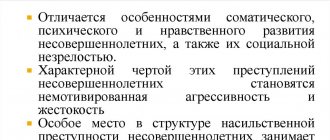Surely you have heard more than once about such a concept as petty theft, but few people know what is considered petty theft. Just today we will look at this topic, talk about liability for this offense, including what liability is provided for minors, and also talk about who has the right to inspect you in the case when a person is caught petty theft in a store, how employees should act in such a situation security To find out all this, read our article.
At what age does criminal liability for this crime begin?
As a rule, under most articles of the criminal code, minors are held liable from the age of sixteen or eighteen, but due to the frequency of cases of theft among teenagers, an exception was made, and it is possible to be fully punished under Article 158 of the Criminal Code of the Russian Federation from the age of fourteen.
If at the time of the crime the accused was between 11 and 14 years old, then the punishment will be placement in a correctional and educational institution. Until the age of eleven, parents or guardians are responsible for the child; criminal liability is not provided for in this case. As punishment, a fine will be issued, determined in size depending on the amount of damage.
Features of the crime
Juvenile offenders are not subject to criminal liability. But from the age of eleven they can be sent to special institutions for re-education and prevention of further violations of the law.
Note!
If a child has committed petty theft but has not reached fourteen years of age, his parents will face sanctions.
Most often, adults are forced to pay a fine, the amount of which is determined depending on the type of act and its severity. If the parents manage to reconcile with the other party, damages can be paid.
If the theft was committed by a teenager aged 14-16 (including by conspiracy as part of a group), the elders will also have to pay a fine for an administrative offense.
If your child is facing punishment, do not rush to panic. Contact our specialists to solve everything with minimal time and nerves.
Criminal or administrative?
It is worth distinguishing between the concepts of theft and petty theft, since the responsibility for them is assumed to be different.
According to the law, theft of someone else's property, whose estimated value does not exceed 2,500 rubles, is petty theft and is considered an administrative offense for which liability is provided under Art. 7.27 Code of Administrative Offenses of the Russian Federation. If the stolen property is valued at more than 2,500 rubles, this entails criminal liability under Art. 158 of the Criminal Code of the Russian Federation.
We talked about the amount of stolen goods that will be held liable under the Criminal Code of the Russian Federation in a separate article.
Exceptions and conditions
There are a number of exceptions in which criminal liability may arise for a smaller amount. These cases occur when the stolen property is significant for the victim; the degree of financial security of the injured party, the ratio of the level of income to the level of damage caused is also assessed. In other cases, the amount of damage is important, but if a child stole something from a store or stole a phone from a classmate’s desk, it no longer matters (read more about shoplifting here).
There are also a number of necessary conditions for theft to be regarded as an administrative offense and not as a criminal offense. They must be carried out ALL TOGETHER, otherwise the crime will be considered criminal regardless of the amount of damage:
- there was only one thief;
- the thief has no criminal record under this article;
- the thief did not take anything out of the victim’s bag/clothes;
- did not unlawfully enter any premises;
- This is not theft from a bank card or bank account;
- This is not theft from an oil pipeline, oil product pipeline, or gas pipeline.
In other words, in all other cases the attacker will be held liable under Art. 158 of the Criminal Code of the Russian Federation. For example, if a thief was with a friend, this is immediately criminal liability. If a thief takes an item out of a bag, it is a crime (more details about pickpocketing are described in this article). If you stole money from a bank card, too. Etc.
How are minors recruited?
In general, the following administrative measures are applied to minors who have committed petty or grand theft:
- demand to publicly apologize to the victim;
- issuing a warning;
- announcement of a regular or severe reprimand;
- transferring the child under the supervision of parents or guardians, educators, under the supervision of a team or public organization, if they agree;
- transfer of the perpetrator for re-education to a civil association or work collective at their request;
- placement of the child in a special treatment and educational institution (with the exception of dispensaries for drug addicts);
- placement of a child (if he has committed particularly dangerous acts or maliciously violates public rules) in a special educational institution. A child from eleven to fourteen years old can go to a special school, and from 14 to 18 years old - to a specific vocational school. The Commission on Minors' Affairs may impose such a measure with a trial period of up to a year.
City and county commissions may propose limiting or depriving a child aged 15-18 of the opportunity to use his earned money or a scholarship, if such accruals occur.
Responsibility for a 14 year old
According to Art. 90 of the Criminal Code of the Russian Federation, a child who has committed a minor theft may not bear criminal liability if it is proven that his correction can occur with the help of compulsory administrative influence.
Thus, a 14-year-old may be assigned the following types of sanctions:
- warning;
- supervision by parents, guardians or a special authority;
- obligation to make amends;
- establishing certain rules for the behavior of a teenager, limiting his leisure time.
Note!
A minor thief can be given several types of punishment at once. The term can range from 1 month to 2 years if the crime was classified as an act of minor gravity, and from six months to 3 years if it was a violation of the law of moderate gravity.
If a child systematically does not adhere to the prescribed measures or continues to commit thefts for large sums, at the request of a specialized body, this measure is canceled, the information is sent for re-examination and bringing the teenager to criminal responsibility.
Punishment for a 15 year old
Fifteen-year-olds who commit theft are subject to all the administrative measures described above; they may also be required to compensate for material damage if the child has his own income. In this case, the amount of damage should not exceed half the amount of the minimum wage in the country.
What does a 16-year-old face for theft?
A 16-year-old teenager for ordinary petty theft will receive the administrative measure of restraint indicated above and will also have to pay a fine. However, this is only possible if the child has his own income.
If the criminal act is not committed for the first time or is classified as serious, a 16-year-old teenager may face criminal punishment up to imprisonment.
To get the most detailed advice on your issue, you just need to follow any of the suggested options:
|
Qualifying features
The article on criminal liability for theft (158 of the Criminal Code of the Russian Federation) includes 4 parts, increasing in severity from the first to the fourth, with distinctions based on the value of the stolen property and the presence of other signs.
Below is a list of the distribution of qualifying features by parts of the article:
- Theft committed in the amount of 2,500 to 5,000 rubles falls under Part 1 of Article 158 of the Criminal Code of the Russian Federation.
- The estimated cost, reaching up to 250,000 rubles, refers to part 2 of Art. 158 of the Criminal Code of the Russian Federation. Part two also includes qualifying features:
- committing theft by a group of persons by prior conspiracy;
- illegal entry into premises or other storage;
- causing significant damage to a citizen;
- the theft was committed from clothing, a bag or other carry-on luggage that was with the victim.
- To part 3 art. 158 of the Criminal Code of the Russian Federation includes grand theft of more than 250,000 rubles and the following qualifying criteria:
- theft with illegal entry into a home;
- theft from an oil pipeline, oil product pipeline, gas pipeline;
- the theft was committed from a bank account or other electronic accounts.
- To part 4 art. 158 of the Criminal Code of the Russian Federation applies to theft committed on an especially large scale over 1,000,000 rubles or by an organized group of persons.
All qualifying signs of theft under the Criminal Code of the Russian Federation were considered by us in this material.
Will my son be sent to prison if he committed theft at the age of 14?
Hello. Will my son be sent to prison if he committed theft at the age of 14?
Lawyer Antonov A.P.
Good afternoon According to Parts 1-3 of Art. 158 of the Criminal Code of the Russian Federation, theft, that is, the secret theft of someone else’s property, is punishable by a fine in the amount of up to eighty thousand rubles or in the amount of the wages or other income of the convicted person for a period of up to six months, or by compulsory labor for a term of up to three hundred and sixty hours, or by correctional labor. for a term of up to one year, or restriction of freedom for a term of up to two years, or forced labor for a term of up to two years, or arrest for a term of up to four months, or imprisonment for a term of up to two years. 2. Theft committed: a) by a group of persons by prior conspiracy; b) with illegal entry into the premises or other storage; c) causing significant damage to a citizen; d) from clothes, a bag or other hand luggage that were with the victim - shall be punishable by a fine in the amount of up to two hundred thousand rubles, or in the amount of the wages or other income of the convicted person for a period of up to eighteen months, or by compulsory labor for a term of up to four hundred and eighty hours, or correctional labor for a term of up to two years, or forced labor for a term of up to five years with or without restriction of freedom for a term of up to one year, or imprisonment for a term of up to five years with restriction of freedom for a term of up to one year or without it. 3. Theft committed: a) with illegal entry into a home; b) from an oil pipeline, oil product pipeline, gas pipeline; c) on a large scale; d) from a bank account, as well as in relation to electronic money (in the absence of signs of a crime provided for in Article 159.3 of this Code) - is punishable by a fine in the amount of one hundred thousand to five hundred thousand rubles or in the amount of the wages or other income of the convicted person for the period from one year to three years, or forced labor for a term of up to five years with or without restriction of freedom for a term of up to one and a half years, or imprisonment for a term of up to six years with a fine of up to eighty thousand rubles or in the amount of wages or other income convicted for a period of up to six months or without it and with restriction of freedom for a period of up to one and a half years or without it. According to Article 20 of the Criminal Code of the Russian Federation, a person who has reached the age of sixteen at the time of committing a crime is subject to criminal liability. Persons who have reached the age of fourteen at the time of committing a crime are subject to criminal liability for murder (Article 105), intentional infliction of grievous bodily harm (Article 111), intentional infliction of moderate harm to health (Article 112), kidnapping (Article 126), rape ( Article 131), violent acts of a sexual nature (Article 132), theft (Article 158), robbery (Article 161), robbery (Article 162), extortion (Article 163), unlawful taking of a car or other vehicle without the purpose of theft (Article 166 ), intentional destruction or damage to property under aggravating circumstances (part two of Article 167), a terrorist act (Article 205), undergoing training for the purpose of carrying out terrorist activities (Article 205.3), participation in a terrorist community (part two of Article 205.4), participation in activities terrorist organization (Part two of Article 205.5), failure to report a crime (Article 205.6), hostage taking (Article 206), knowingly false report of an act of terrorism (Article 207), participation in an illegal armed group (Part two of Article 208), hijacking of an aircraft or water transport or railway rolling stock (Article 211), participation in mass riots (part two of Article 212), aggravated hooliganism (parts two and three of Article 213), vandalism (Article 214), illegal acquisition, transfer, sale, storage , transportation or carrying of explosives or explosive devices (Article 222.1), illegal production of explosives or explosive devices (Article 223.1), theft or extortion of weapons, ammunition, explosives and explosive devices (Article 226), theft or extortion of narcotic or psychotropic drugs substances (Article 229), disabling means of transport or means of communication (Article 267), encroachment on the life of a state or public figure (Article 277), attack on persons or institutions that enjoy international protection (Article 360), an act of international terrorism ( Article 361). If a minor has reached the age provided for in parts one or two of this article, but due to mental retardation not associated with a mental disorder, during the commission of a socially dangerous act he could not fully understand the actual nature and social danger of his actions (inaction) or direct by them, he is not subject to criminal liability. According to Article 88 of the Criminal Code of the Russian Federation, the types of punishments imposed on minors are: a) fine; b) deprivation of the right to engage in certain activities; c) compulsory work; d) correctional labor; e) restriction of freedom; f) imprisonment for a certain period. A fine is imposed both if the convicted minor has independent income or property that can be levied on, or if there is none. A fine imposed on a convicted minor may, by a court decision, be collected from his parents or other legal representatives with their consent. A fine is imposed in the amount of one thousand to fifty thousand rubles or in the amount of the wages or other income of the convicted minor for a period of two weeks to six months. Compulsory work is assigned for a period of from forty to one hundred and sixty hours, consists of performing work that is feasible for a minor, and is performed by him in his free time from study or main work. The duration of execution of this type of punishment by persons under the age of fifteen years cannot exceed two hours a day, and by persons aged from fifteen to sixteen years - three hours a day. Correctional labor is assigned to convicted minors for a period of up to one year. Restriction of freedom is imposed on convicted minors as the main punishment for a period of two months to two years. Punishment in the form of imprisonment is imposed on convicted minors who committed crimes under the age of sixteen for a period of not more than six years. For the same category of minors who have committed particularly serious crimes, as well as for other convicted minors, punishment is imposed for a term of not more than ten years and is served in educational colonies. Punishment in the form of imprisonment cannot be imposed on a convicted minor who committed a crime of minor or medium gravity for the first time at the age of sixteen, as well as other juvenile convicts who committed crimes of minor gravity for the first time. When a convicted minor is sentenced to imprisonment for committing a grave or especially grave crime, the lower limit of punishment provided for by the relevant article of the Special Part of this Code is reduced by half. If a juvenile convict who has been given a conditional sentence has committed a new crime during the probationary period that is not particularly serious, the court, taking into account the circumstances of the case and the identity of the perpetrator, may re-decide on a conditional sentence, establishing a new probationary period and assigning fulfillment of certain duties provided for in part five of Article 73 of this Code. According to Article 90 of the Criminal Code of the Russian Federation, a minor who has committed a crime of minor or moderate gravity may be released from criminal liability if it is recognized that his correction can be achieved through the use of compulsory educational measures. The following compulsory educational measures may be assigned to a minor: a) warning; b) transfer to the supervision of parents or persons replacing them, or a specialized government body; c) imposition of an obligation to make amends for the harm caused; d) restricting leisure time and establishing special requirements for the behavior of a minor. A minor may be simultaneously assigned several compulsory educational measures. The period for applying compulsory educational measures provided for in paragraphs “b” and “d” of part two of this article is set at a duration of from one month to two years when committing a crime of minor gravity and from six months to three years when committing a crime of medium gravity. In case of systematic failure of a minor to comply with a compulsory educational measure, this measure, upon the proposal of a specialized government body, is canceled and the materials are sent to bring the minor to criminal responsibility. Thus, if the value of the stolen property did not exceed 250,000 rubles (parts 1 and 2 of Article 158 of the Criminal Code of the Russian Federation), then the court will most likely assign you compulsory educational measures. According to Part 3 of Article 158 of the Criminal Code of the Russian Federation, it is possible to assign a suspended sentence.
Sincerely, lawyer Anatoly Antonov, managing partner of the law firm Antonov and Partners.
Still have questions for your lawyer?
Ask them right now here, or call us by phone in Moscow +7 (499) 288-34-32 or in Samara +7 (846) 212-99-71 (24 hours a day), or come to our office for a consultation (by pre-registration)!
Responsibility under Art. 158 of the Criminal Code of the Russian Federation
So, what is the penalty for this crime?
- Part 1 art. 158 of the Criminal Code of the Russian Federation, the maximum punishment is limited to imprisonment for up to 2 years, the minimum - a fine of up to 80,000 rubles.
- Part 2 art. 158 of the Criminal Code of the Russian Federation is punishable by imprisonment for a term of up to 5 years with additional restriction of freedom for a term of up to one year, with a minimum fine of up to 200,000 rubles.
- Part 3 art. 158 of the Criminal Code of the Russian Federation is punishable by a maximum of imprisonment for up to 6 years with a fine of 80,000 rubles, and a minimum of a fine of up to 500,000 rubles.
- Part 4 art. 158 of the Criminal Code of the Russian Federation is punishable by imprisonment for a term of up to 10 years with a fine of up to 1,000,000 rubles and with or without restriction of freedom for a term of up to 2 years.
Read more about criminal liability for theft provided for by the Criminal Code here.
Responsibility under 7.27 Code of Administrative Offenses of the Russian Federation
According to Article 7.27 of the Code of Administrative Offenses of the Russian Federation, Part 1 (theft of up to 1000 rubles) entails a fine of up to five times the value of the stolen property, but not less than one thousand rubles, or administrative arrest for up to fifteen days. It is also possible to award compulsory work for up to fifty hours.
Part two of Article 7.27 of the Code of Administrative Offenses of the Russian Federation for theft of 1000 to 2500 rubles provides for the imposition of an administrative fine in the amount of up to five times the value of the stolen property , but not less than three thousand rubles, or administrative arrest for a period of ten to fifteen days. The period of compulsory work, which can also be awarded under the second part, has been increased to one hundred and twenty hours.
Attention! If the accused has already been brought to justice under Article 7.27 of the Code of Administrative Offences, and less than a year has passed since the serving of the sentence, then repeated punishment under this article is impossible. In this case, a criminal case will be initiated under Art. 158 parts 1.
The statute of limitations for administrative offenses is one year, that is, if the last time a fine was issued, and less than one year has passed since its payment, the administrative violation will be reclassified as a criminal violation. After the expiration of the statute of limitations, such reclassification will not be made.
What is the responsibility of parents for theft by a minor child?
If the theft was committed by a minor (under 14 years of age) who cannot be prosecuted, the punishment is transferred to his parents or guardians. In this case, the child can be registered with the Commission on Minors' Affairs.
Most often, law enforcement agencies issue a fine to the mother or father. The amount you have to say goodbye to depends on the severity of the act. Sometimes it is possible to find common ground with the injured party. In such cases, it is enough to compensate for the damage caused.
Note!
If a theft is committed by a person aged 14-16 years who does not have his own income, financial responsibility will also be placed on the parents.
Corpus delicti
In this case, the object of the crime is direct theft, directed against the property rights of the injured party, the objective side of the theft does not contain violence, and the theft itself is committed secretly, for example, the owner and observers are absent or do not notice the crime, and if they see it, they do not understand the illegality of the actions or the person committing the theft is confident in his invisibility.
The subject of the crime will be a citizen who has reached the age of fourteen. The subjective side is direct intent with selfish intentions to obtain benefits.
Read about the definition of the crime, objective and subjective signs of theft here.
Statute of limitations
For theft, the maximum statute of limitations is established for the third and fourth parts - 10 years, for the second part - 6 years, for the first part - 2 years. As for administrative offenses, the statute of limitations under Art. 7.27 of the Code of Administrative Offenses of the Russian Federation is 2 months.
We also talk about how long the statute of limitations is for cases involving theft in a separate article.
At what point is the theft complete?
Often, crimes are falsified by employees of enterprises, most often stores (read what to do if you are accused of a theft that you did not commit, including shoplifting).
For example, if a teenager stole something, was noticed at the checkout, but has not yet left the store, this case is not considered an administrative offense, since the crime has not been completed. In such situations, the maximum punishment is a fine from the store to the parents of the minor, but consideration of the case with the involvement of law enforcement agencies is inappropriate.
The crime can be considered completed if the thief left the crime scene with the stolen goods , that is, he can dispose of them at his own discretion. Only in this case will the crime be considered completed and not in any others. The attacker must have a real opportunity to dispose of someone else's property.
The concepts of “theft”, “robbery”, “robbery”
The Criminal Code contains several concepts that may seem synonymous to a person far from jurisprudence - theft, robbery and robbery. In our article we will rather talk about theft - the secret theft of someone else's property. Robbery is the open theft of someone else's property, and robbery is an attack on another person for the purpose of robbery. In other words, if a child tries to take some product out of a store without paying for it, he is committing theft.
For any crime committed, Russian criminal legislation provides for its own type of liability. A person who has reached the age of sixteen at the time of committing a crime is subject to the most severe criminal liability.
For certain types of crimes (medium, grave and especially grave), liability is provided from the age of 14, including theft. It is important to know that citizens under the age of 14 are not subject to criminal liability for theft.







